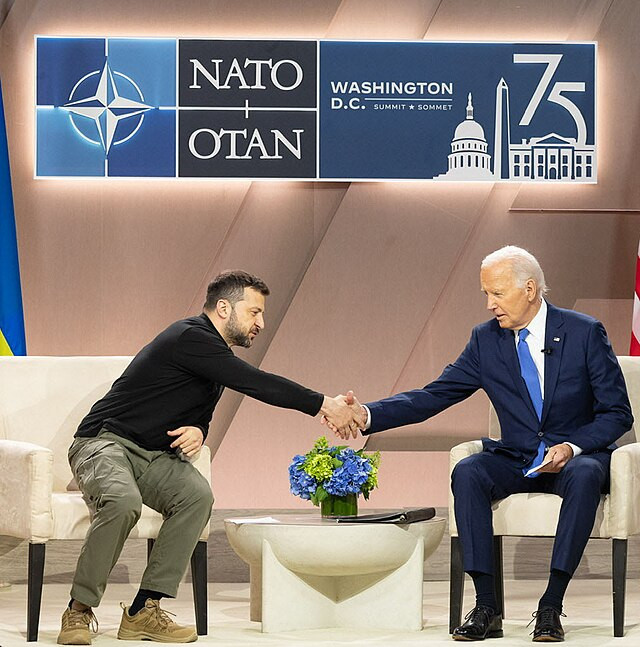President Joe Biden has authorized Ukraine to use U.S.-supplied long-range Army Tactical Missile Systems (ATACMS) to strike inside Russian territory, according to U.S. officials. The move, confirmed by two officials to ABC News, represents a departure from Biden's previous stance against using American-made weapons beyond Ukrainian borders, a restriction long debated amid escalating tensions with Moscow.
Various news outlets, including Reuters, the Associated Press and the New York Times, have also reported on this matter.
The weapons in question are the Army Tactical Missile Systems (ATACMS), which have a range of up to 190 miles. The decision, reportedly imminent, comes as Ukraine looks to push back against Russian forces, including in regions such as Kursk, where Moscow has deployed a substantial military presence, including troops from North Korea. Ukrainian President Volodymyr Zelensky has long pressed the U.S. to loosen restrictions on these missiles, arguing that deeper strikes into Russian territory are necessary for Ukraine's defense.
While neither the White House nor the Department of Defense has formally commented on the reports, Zelensky hinted at the potential change in a recent address. "Blows are not inflicted with words. Such things are not announced. The rockets will speak for themselves," he said.
This policy shift comes at a critical juncture as Biden prepares to leave office in January. The move appears to be aimed at strengthening Ukraine's position before the transition of power to President-elect Donald Trump, who has expressed skepticism about continued heavy U.S. support for Kyiv. Trump and his incoming administration have suggested they may seek a different approach, potentially involving negotiations that could lead to a ceasefire or territorial concessions.
Polish Foreign Minister Radoslaw Sikorski welcomed reports of Biden's pending decision, stating that the U.S. was finally "responding to Russia in a language that [President Vladimir] Putin understands." However, the potential escalation has drawn warnings from Moscow. Russian lawmaker Vladimir Dzhabarov, speaking to state news agency TASS, cautioned that any Ukrainian strikes on Russian territory with U.S.-supplied missiles would lead to immediate consequences and potentially spark a third world war.
The Biden administration's reluctance to cross this line earlier stemmed from concerns about provoking a wider conflict. Officials have argued that U.S.-provided drones, which Ukraine has used effectively for deep strikes within Russia, offer a less provocative and more sustainable option than the limited stock of long-range missiles. Nevertheless, recent battlefield developments appear to have swayed the administration. Ukrainian forces have struggled to regain momentum in the war, as Russian troops, bolstered by North Korean assistance, have made gains along key frontlines.
Allowing Ukraine to use ATACMS inside Russia could bolster Kyiv's military capabilities at a critical moment. Zelensky and his administration have emphasized that stronger offensive measures are needed to counter Russian advances and strikes on Ukrainian cities and critical infrastructure. Moscow's recent barrage of missile and drone attacks has further underscored Ukraine's urgent need for more robust defenses and retaliatory options.
The broader implications of Biden's decision are significant. Any Ukrainian strikes deep into Russian territory could shift the dynamics of the conflict and raise the stakes for NATO. Moscow has repeatedly warned that such actions would be seen as a major escalation. As Biden prepares to pass the reins of power, his administration's decision could leave a lasting impact on the course of the war and the future of U.S.-Russia relations.
While Biden's move signals increased support for Ukraine, questions remain about how the Trump administration will handle the complex U.S.-Ukraine-Russia relationship. Trump has vowed to end the war quickly but has offered few details on his strategy. Some analysts believe Trump may seek to negotiate terms that favor Russian territorial gains, a concern that looms large over Kyiv and its allies in Europe.
Biden's decision to potentially allow the use of U.S. missiles within Russia highlights the high stakes at play and the complex balancing act facing American leaders. As Zelensky said, "The missiles will speak for themselves." Whether this move ultimately strengthens Ukraine's hand or pushes the conflict into a more dangerous phase remains to be seen.






